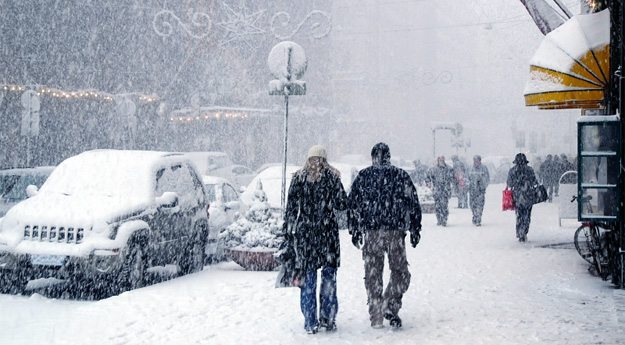Your cart is currently empty!
Falling Into a Canadian Winter. Guest Post by Jillian McIntosh, Psychotherapist

It’s that time of year. The leaves start to fall and the weather starts to cool. We get excited about Halloween and cozy knit sweaters and pumpkin spice everything. Then there’s that one day in September when you realize there are no more surprise warm fall days and it hits you: this… is the beginning of the end. Brace yourself, because you’re about to fall face first into a Canadian Winter.
Not everyone feels this way. Some of you look forward to the coziness and the family time and the crunching sound that your boots make when you walk through the snow. And your wide-eyed optimism of winter is probably annoying so many people around you. But is it annoyance, or is it possible that it’s jealousy?
For a lot of people autumn can be more anxiety provoking than winter. The beginning of September historically has been the start of a new school year and a new season. Many people find this a time of reflecting on the last year and that can stir up really positive or really negative emotions. We are also prepping for change. And often, when we prepare for change we imagine the absolute worst-case scenario so we feel we have more control over the imagined outcome. People may find themselves mentally preparing for social isolation and feelings of depression and anxiety. And oftentimes the anxiety of an imagined event or emotion is experienced worse than the actual event itself. So is this catastrophic thinking really helpful in our seasonal transition? The answer is, “Well, sort of.” It depends on what you do with it.
Many people self-diagnose and attribute their mood change to Seasonal Affective Disorder (SAD) where they believe the changes stem from biological factors. These factors include melatonin production changes, serotonin levels fluctuating, and vitamin D deficiency. They can result in sadness, lethargy, fatigue and sometimes suicidal thoughts. There is a difference between SAD and what we sometimes refer to as “Winter Blues,” even though the symptoms are nearly identical. If you feel you may have SAD it is important to talk with your doctor for diagnosis and treatment. Many people though are experiencing the Winter Blues and attribute them to biological causes while ignoring or minimizing the impact of environmental change.
If you find yourself thinking of all of the changes coming up and are already grieving the loss of summer experiences that bring you joy, this can be greatly informative as to how you can start to prepare for our darker and colder seasons. Here are some tips that I share with my clients, friends, family, and myself. Because yes, even therapists have to try hard to make it through sometimes.
Creating Novel Experiences
If you feel like all of the things you enjoy are disappearing as the days get shorter, it might be time to think of experiences you might want to try that you can look forward to as summer comes to an end. Hygge is all the rage right now. You can look it up once on Pinterest and have about one thousand more suggested posts to read the next time you log on. The Danish philosophy lends itself to embracing coziness and enjoying simple pleasures in life such as warm drinks, reading, journaling, using candles, and mindfully enjoying small indulgences.
If slowing down isn’t your thing, you may think about sports or activities to enjoy that are winter specific. You can start snowshoeing or join a hockey league. You can even create an outdoor rink in your own backyard. People work outside in this weather all day long, you just need to invest to dress for it. I look for end of season sales for good winter wear and I also check out the thrift stores. You’ll be surprised what you can find second hand that can help you actually enjoy your time outdoors.
Maybe you are the creative type. Winter is a great time to get involved in projects. You can paint a room in your house, start up sewing projects that have been gathering dust, start felting, painting, sculpting, writing, coloring… now is the time to run to Michael’s and start planning for new outlets. Even if you are horrible at it, it’s not about being perfect or even good for that matter. It’s about finding something that can occupy your mind that isn’t more YouTubing or Facebooking or Instagramming or Snapchatting. We’re looking for something novel and different and potentially challenging that will keep spinning thoughts at bay. Dual processing is difficult. So when your mind is occupied with activities and people and projects, there is less room for intrusive negative thoughts. When I moved to Montreal I went to the museums and galleries and outdoor winter events, because it was new to me. I tell people all the time “If I put half the effort I did in Montreal, into Winnipeg, I would’ve loved my home city ten times more.” Now I do.
Substituting
You may be a creature of habit and have a hard time starting things that are new. When you think of the things that you will miss about summer, ask yourself what do they boil down to. If you spend time at the lake on the weekends, what about that brings you joy? Is it the time away from work and responsibility? Is it being in the water? Is it more quality time with family and friends? Does it force you to unplug from phones and computers? Or is it just being closer to nature?
If you spend the summer outside doing sports and activities, how does this feed you? Is it the physical activity and endorphins? Camaraderie of teammates? Is it challenging yourself and the competition aspect?
If you spend a lot of time socializing in summer with friends and/or family, what gives you that happy feeling? Is it preparing for company and cooking meals? Is it the conversation? Is it taking pride in your home and sharing it with others?
When you narrow down what the actual joy triggers are, it is easier to find substitutions. For example, if you miss the cabin, it is not about turning it from a three season to a four season home. It is about finding ways to replace the joy givers from the cabin. Maybe you need to schedule your technology time, download a podcast on meditation to give you some moments of peace, or get a pass to the pool. If you miss your sports activities and find it is the physical exercise that is helpful for your mood, you may want to invest in a gym pass or join an indoor league. If you miss backyard barbeques, you can invite people over for potlucks. No, these are not exact substitutes and will not feel exactly the same. But putting in the effort to fill your joy time with activities you will derive similar feelings from will make a difference in how you experience the seasons.
If you can make the coming season 20% better than last year, you will remove 20% of the dread for the following year. It is about making small changes in behaviours that can have a huge impact on your mood and well-being over time. It doesn’t have to be costly to make a change. It doesn’t have to be a solo endeavour either, as it can be a challenge that you share with a friend or partner. Sometimes these tips sound ridiculous and I can attest to rolling my eyes at “self care” for myself long after my masters training. But once you get the ball rolling and start investing in your joy, you will feel a sense of pride in your ability to elevate your mood. And maaaybe you might just change your mind about our winters after all. ?
Guest Post written for Huna by Jillian McIntosh, M.A., Psychotherapist
- 10 Holistic Skin Firming Tips That Actually Work - June 22, 2025
- What Does Facial Toner Do & Why You Should Use One - June 18, 2024
- Beyond Sunscreen: 7 Ways to Protect Skin from the Inside Out in Summer - June 18, 2024



3 comments on “Falling Into a Canadian Winter. Guest Post by Jillian McIntosh, Psychotherapist”
Well written. Some basic information to serve as either motivation or a reminder. Worth the time to read. 🙂
Thanks for your comment Karen. Happy you enjoyed the read. 🙂
Good blog post. I certainly love this website. Thanks!